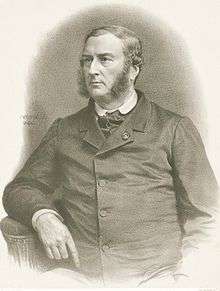Jules Béhier

Louis-Jules Béhier (26 August 1813, Paris – 7 May 1876, Paris) was a French physician.
In 1837 he received his doctorate at Paris with the dissertation-thesis "Recherches sur quelques points de pathologie". In 1844 he obtained his agrégation and in 1849 became médecin des hôpitaux. In 1864 he attained the chair of internal pathology at the faculty of medicine in Paris. As a professor, he was associated with the Hôpital de la Charité (1864–67), Hôpital Pitié (1867–69) and the Hôtel-Dieu (1869–76). In 1866 he became a member of the Académie nationale de médecine (section for pathological anatomy).[1]
He is credited with the popularization of the hypodermic syringe in France,[2] a device that had been invented in 1853.[3] He is also known for his pioneer experimentation with the opiate narceine,[4] and for his advocacy of hydrotherapy (cold water baths) and alcohol (a "Todd's mixture" containing brandy) for the treatment of typhoid fever.[5] With dermatologist Alfred Hardy, he is associated with the eponym "Béhier-Hardy symptom" (also known as "Béhier-Hardy aphonia"), described as the loss of voice as a sign of the early stages of pulmonary gangrene.[6]
Selected works
- Traité élémentaire de pathologie (with Alfred Hardy), (3 volumes, 1844–55).
- Conférences de clinique médicale, faites à la Pitié, 1861-1862 (with Albert Louis Menjaud and Adrien Proust), 1864.
- "A Contribution to the history of Leucemia (Intestinal Leucemia)", (In English, 1868).
- Transfusion du sang : opérée avec succès chez une jeune femme, 1874.
- Sur le traitement du rhumatisme, 1876.[7]
References
- ↑ Behier, Louis Félix Jules Sociétés savantes de France
- ↑ Lectures on clinical medicine: delivered at the Hotel-Dieu, Paris, Volume 35 edited by Pierre Victor Bazire
- ↑ 1000 Inventions and Discoveries
- ↑ The Boston Medical and Surgical Journal, Volume 72
- ↑ Medical news and library, Volume 32
- ↑ Physical Signs in Medicine and Surgery: An Atlas of Rare, Lost and Forgotten ... by Fred Ashley White
- ↑ IDREF.fr bibliography